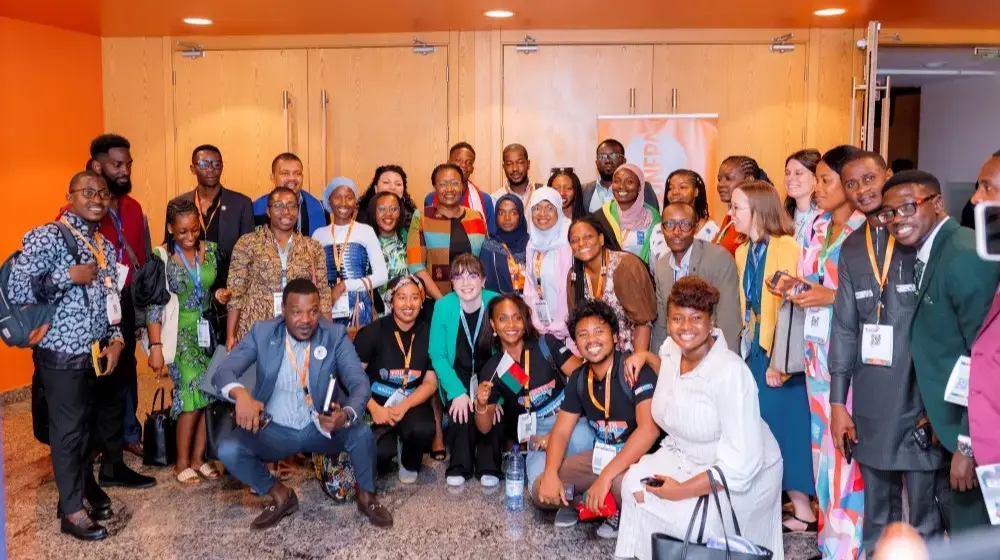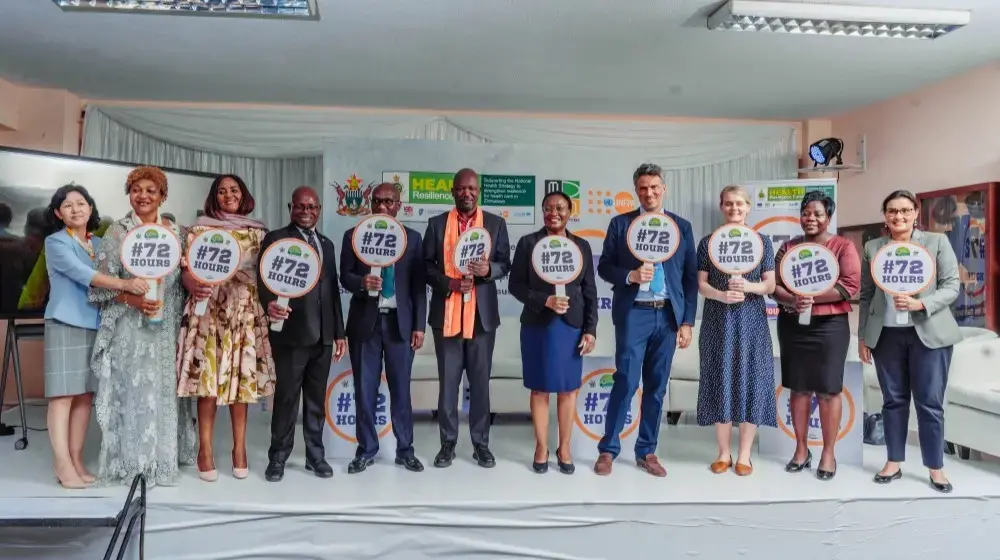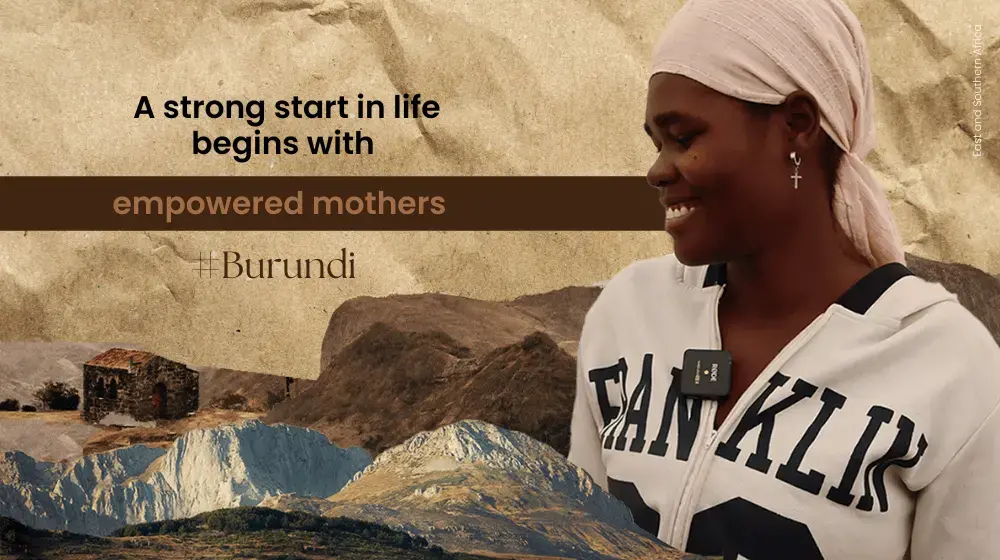ESTCOURT, South Africa— “If a boy tells me about giving me a future or money, I simply tell him that I am a person with dreams, so I want to achieve them and make my parents proud,” says Amanda Hadebe, 13, from uThukela Primary School.
These powerful words from the learner at Tatazela High School bring hope to the community of Estcourt (in the Inkosi Langalibalele sub-district), given the socioeconomic challenges it faces. High rates of teenage pregnancy, HIV infection and abduction of girls are a reality for girls, adolescents and youth.
I’ve been taught about self-esteem and self-motivation, and how to handle peer pressure.
“I’ve been learning to take care of myself. I’ve been taught about self-esteem and self-motivation, and how to handle peer pressure,” says Siyathothoko Mkwanazi, 14, a grade 8 boy.

giving them the right sexual and reproductive health information.”
– Dr. Julitta Onabanjo, UNFPA East and Southern Africa Regional
Director, at Injisuthi Clinic with learners from Bonokuhle High
School, Enkomokazini Technical High School and Mjwayeli Primary
School. © UNFPA ESARO/Derick Nyasulu
Leaners are being empowered to safeguard their future, reclaim their voices and spaces, and ensure that they make the right choices, including those relating to their sexual and reproductive health.
Thanks to the provision of life orientation skills by the South African Government’s Departments of Education and Health, with support from loveLife and UNFPA’s youth flagship programme, Safeguard Young People, this intervention is proving a beacon of light in the community: more learners are choosing to stay in school as a result.
Andiswa Mlangeni, 12, a grade 8 learner, says he has not only learned about sexual and reproductive health, but also about rights. He has been taught that becoming a better man means “not to hit girls.” He also learned that when he one day starts engaging in sexual relations, he has to use a condom to prevent infection with HIV because “it is a bad disease.”
The life skills discussions complement his parents’ teachings to not engage in sexual relations with girls. He would like to see all of his peers attending these lessons so they can be better people, he said.
Amanda learned from her life orientation teacher how to avoid falling pregnant at an early age, and boys were also taught how they should avoid impregnating girls. She found the information particularly helpful.
He taught us that we must believe in ourselves, since peer pressure always has a negative effect, hence the reason why many girls fall pregnant.
“He taught us that as girls, we must not copy what other people are doing as people come from different homes with different cultures. Rather, we must believe in ourselves, since peer pressure always has a negative effect, hence the reason why many girls fall pregnant,” she says. Her teacher has taught them other valuable lessons as well, such as not drinking alcohol but instead focusing on getting a good education, and to use education as the key to a better life.
Sister Sibongiseni Mhlanga, Primary Health Care Clinic Supervisor at Estcourt Hospital, has only positive words to say about the programme. “loveLife has been instrumental in engaging the youth by educating them around sexual and reproductive health issues, so that they can make informed choices and withstand peer pressure,” she says.
The programme uses loveLife groundBREAKERs, who are peer motivators and community mobilizers. “The groundBREAKERs, who are facility-based, work with champions – professional nurses or cadre – to help the youth understand the importance of staying in school and to avoid falling pregnant,” Sister Mhlanga says.
What young people want is the provision of health services and information in schools, says Lethu Biyela, Department of Health Youth Advisory Panel (YAP) member.
Ngozo Boesman, Senior Education Specialist responsible for psychological services, agrees: “Incidents of teenage pregnancy have declined in schools as most learners have access to the right information, which enables them to make informed choices about their future.”
UNFPA works with partners to ensure no one is left behind

Bhengu, Department of Social Development; Sister Sibongiseni
Mhlanga, Estcourt Hospital; Makhosi Dladla, Department of Health;
and Dr. Julitta Onabanjo, UNFPA Regional Director for East and
Southern Africa, discuss best practices on engaging learners on
comprehensive sexuality education. © UNFPA ESARO/
Derick Nyasulu
UNFPA has supported the integration of sexual and reproductive health services in clinics to ensure that health seekers are provided with up-to-date information on all services, including family planning and HIV-related services.
The Fund has also assisted with capacity building to ensure the delivery of quality integrated sexual and reproductive health services to women, adolescent girls and youth.
“These services are much-needed in the Estcourt area as many community members still hold the view that it is okay for a young girl to leave her education once a man has expressed interest in marrying [her],” says Sister Mhlanga.
“This is an unfair practice to the girl child as it puts her life at risk of early birth complications, as well as significantly reduces her chance of being economically independent,” she says.
UNFPA’s programme support complements the existing municipality education development programme plans on areas such as HIV and AIDs, teenage pregnancy and drug and substance abuse, as YAP members hold discussions with learners to understand their needs, teach them life skills and encourage them to access health services, including sexual and reproductive services at clinics, Mr. Boesman says.
“Due to UNFPA’s support, interventions in the schools of Bhekathina and Bonokuhle have led to an improvement in grade 12 learner results,” he said.
Planning better to end harmful practices
On a visit to the region to review UNFPA’s work on the ground in advancing sexual and reproductive health and rights, Dr. Julitta Onabanjo, UNFPA Regional Director for East and Southern Africa, asked partners questions about the prevailing harmful practices, including gender-based violence, and what is needed to bring about changes to negative social norms and behaviour.
According to Fezile Dlamini from Bhekezulu Self Sufficient Project (BSSP), the long-standing traditional practice of Ukuthwala has evolved into something that is no longer consensual. In the past, if a girl was in love with someone her parents disapproved of and they wanted her to marry a certain man of their choosing instead, then the less-favoured man would ‘abduct’ the girl with her consent. Today, however, men are abducting girls to take them as brides without their consent. This needs to change.
Abduction cases are being reported to the police but community engagement is key to changing mind-sets and ensuring lasting values and norms that see women as equal partners.
“Abduction cases are being reported to the police but community engagement is key to changing mind-sets and ensuring lasting values and norms that see women as equal partners,” says Ms. Dlamini.
- Derick Nyasulu





